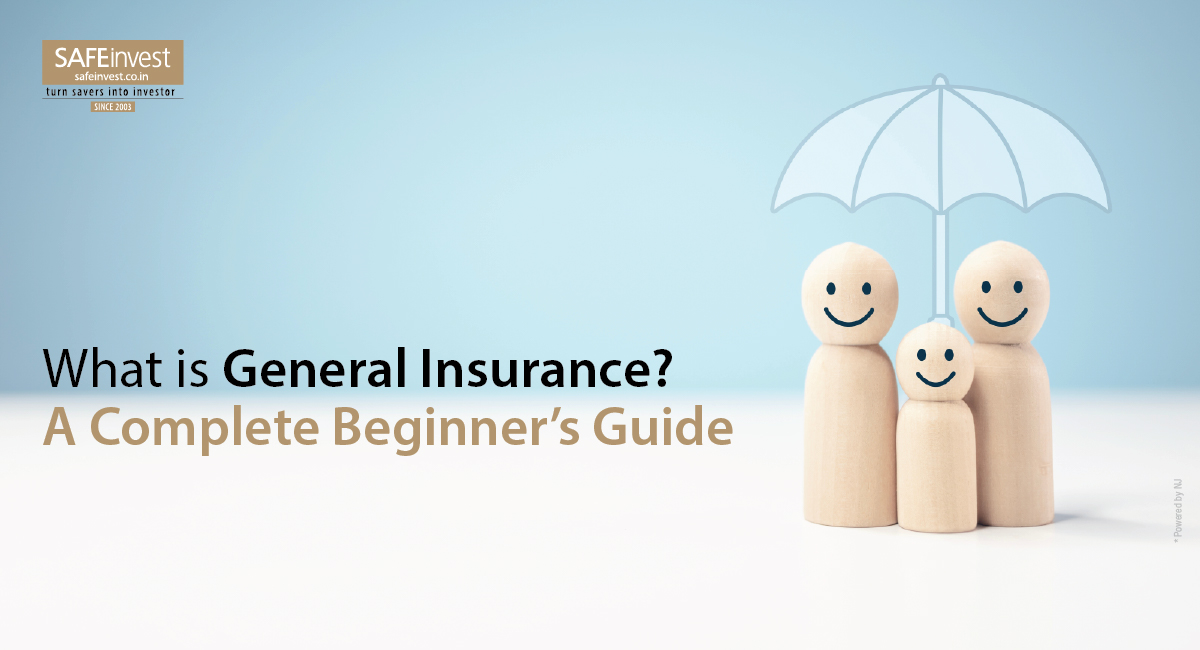What Is General Insurance? A Complete Beginner’s Guide

Navigating the World of General Insurance
Life throws curveballs when you least expect them. Accidents, illnesses, natural disasters, and unexpected losses can hit hard and fast. While we can't predict these events, we can certainly prepare for them.
That's where General Insurance comes in. It's your financial shield for valuable assets like your vehicle, health, home, travel, and even your business. Unlike life insurance, which focuses on life-related risks, general insurance safeguards your non-life assets. Think of it as a pact between you and the insurer: you pay a premium, and in return, they promise to cover your losses when unforeseen situations arise.
COMMON MYTHS TO BREAK
- “I’m careful, I don’t need insurance.”
Accidents don’t ask permission. - “Insurance claims never get approved.”
It's not true. If your claim is valid and the documents are clear, then you will have a seamless claim settlement experience. - “It's too expensive.”
The basic plans are affordable. But if you don't have insurance, the expenses borne from the unforeseen events will cost you higher.
TYPES OF GENERAL INSURANCE
Here’s a quick breakdown of what general insurance covers:
- Health Insurance:
Health insurance is a policy that helps cover the cost of medical expenses. It protects you from financial strain in case of illness, hospitalisation, surgery, or other health-related issues. One should consider it because medical treatments can be expensive. A health insurance policy ensures you receive the best care without draining your savings. It also gives access to quality hospitals and treatments on a cashless basis*, especially during emergencies. - Motor Insurance:
Motor insurance provides financial protection against damage to your vehicle or third-party liabilities arising from accidents, theft, or natural disasters. In India, it’s mandatory to have at least third-party motor insurance. Beyond compliance, it protects you from costly repairs, legal claims, and loss in case of theft or major accidents. - Travel Insurance:
Travel insurance is designed to protect you from unexpected issues during your domestic or international trips, offering both financial and logistical support. Travel disruptions can lead to significant expenses. Travel insurance ensures peace of mind when you're away from home, especially in foreign countries where healthcare or legal help is expensive. - Home Insurance:
Home insurance covers your house and its contents from unexpected damage or loss due to accidents, natural disasters, or theft. Your home is one of your most valuable assets. Home insurance ensures you’re financially protected in case of disasters or losses, which can otherwise cost lakhs to repair or replace. - Commercial Insurance:
Commercial insurance protects businesses from operational risks like fire, theft, employee injury, or legal liabilities. For business owners, any disruption can lead to major financial setbacks. This insurance helps keep your business running smoothly by absorbing unexpected costs and liabilities.
BENEFITS OF GENERAL INSURANCE
- Asset Protection: One of the key advantages of general insurance is safeguarding your valuable assets, such as your home, vehicle, or business property. The former provides coverage against such events, ensuring that any financial loss related to damage, repairs, or replacement is handled efficiently. It helps preserve the value of what you own and supports quick recovery after a loss.
- Customizable Plans: General insurance policies offer flexibility to match different needs. Whether you're an individual, a family, or a business, you can choose from a variety of coverage options and add-on features. This allows you to tailor the plan to your lifestyle, location, and specific risk factors. From basic protection to comprehensive coverage, customizable plans ensure you only pay for what you need, making insurance more efficient and personal.
- Peace of Mind: Perhaps the most overlooked but important benefit is the peace of mind insurance provides. Life is unpredictable, and having a solid general insurance policy removes the constant worry of “what if something goes wrong?” Knowing that you're protected against potential losses allows you to focus on your goals, health, travel, or business without stress.
HOW GENERAL INSURANCE WORKS
General insurance operates on a fundamental principle of risk sharing, a cooperative mechanism designed to mitigate the financial impact of unforeseen events. At its core, the insured individual or entity (you) pays a predetermined sum, known as a premium, to the insurance company (the insurer). In exchange for this premium, the insurer undertakes a contractual obligation to provide financial compensation for specified losses should certain defined events occur.
The process generally includes:
- Buying the Policy: This initial stage involves the prospective policyholder assessing their insurance needs and selecting a suitable policy from an insurer, carefully reviewing the terms and conditions, coverage limits, exclusions, and premium costs. The policy comes into effect upon the successful payment of the premium.
- Facing an Event: This crucial step occurs when an insured event, as defined by the policy, takes place. It is essential for the policyholder to promptly inform the insurer about the incident, providing preliminary details.
- Filing a Claim: Following the event, the policyholder formally initiates a claim. This involves submitting a claim form along with all necessary supporting documentation. Depending on the type of claim, this might include medical bills, police reports, repair estimates, travel documents, or property damage assessments. The accuracy and completeness of these documents are vital for a smooth process.
- Claim Evaluation & Settlement: Upon receiving the claim, the insurer undertakes a thorough evaluation. This often involves assigning a surveyor or claims adjuster to investigate the incident, verify the facts, and assess the extent of the loss. Once the investigation is complete and the documents are approved, the insurer processes the payment for the loss and associated expenses, strictly adhering to the terms and conditions stipulated in the policy. This could be a direct payment to the service provider (e.g., hospital, garage) or reimbursement to the policyholder.
CONCLUSION
General insurance is more than just a policy; it’s a smart financial safeguard that protects what matters most. From covering medical bills and vehicle damage to securing your home and business, it helps you stay prepared for life’s uncertainties. With customizable plans, legal protection, and peace of mind, general insurance ensures you’re not caught off guard when the unexpected happens. Investing in the right coverage today means building a safer, more secure tomorrow.
Disclaimer:
*Subject to the approval from the Insurer.
This material is intended for spreading insurance awareness, education and information purposes only. The information, details and opinion contained in this material does not constitute legal or professional advice and should not be relied upon or treated as substitute for specific advice relevant to particular circumstances. Nothing in this material urges to purchase, renew, reinstate, increase, retain or modify a policy of insurance. This material is general in nature and does not promote/ recommend any specific insurance product, policy or insurer. The views or expressions contained in this material are not necessarily of the sender and the sender neither assumes any responsibility/liability nor does guarantee its accuracy, suitability, completeness and adequacy. The figures and data that may be appearing in this material are taken from various sources deemed reliable by the sender. The content of this material including images, charts, graphics and pictures are protected intellectual properties and cannot be amended, copied, reproduced, replicated, republished, uploaded, posted, published, transmitted, displayed or distributed for any non-personal use without obtaining prior written permission, any non-adherence of which may attract appropriate legal action. Insurance is a subject matter of solicitation. For more details on risk factors, terms and conditions please read the sales brochure carefully before concluding a sale.
